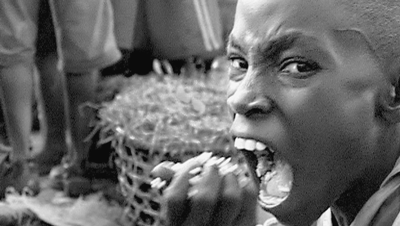The European demand for a giant fish creates impoverishment in Africa
Maggots squirm around the muddy toes of a reed-thin woman as she works the drying racks containing discarded carcasses of Nile perch, the huge fish which have taken over Lake Victoria, the world’s second-largest lake located in Central Africa, where Kenya, Tanzania and Uganda meet. The camera moves to her face and where her right eye should be, there is an empty socket. She is clad in rags and explains, rather matter-of-factly, that the strong ammonia fumes generated by the rotting fish carcasses have caused her to lose her sight. She works ceaselessly, hanging and removing what would be regarded elsewhere as the rankest, most fetid garbage unfit for human consumption. This piscine bounty is sold as food scraps and consumed by the poorest of the poor who boil it into a devilish soup.
This is Mwanza, a lakeside town in Tanzania, whose commerce is generated by the Nile perch. In another part of town in a first-class hotel, a meeting is underway. European businessmen have gathered and are congratulating each other in self-satisfied tones on the business bonanza generated by this giant fish. Hundreds of tons are exported daily to European markets. They take evident pride in the success of this operation, especially the profits which are generated. The fish are caught by traditional fisherman and brought to a high-tech factory where they are filleted, packaged and placed in cold storage for air shipment to the developed world.
Who benefits from this windfall? Certainly not the majority of ordinary Tanzanians who live in abject poverty and are lucky if they can manage to occasionally get their hands on some of the discards from this multi-national corporate endeavor.
Globalization meets Charles Darwin in this eerie, frightening portrait of what consumer capitalism is doing to most of the world’s population. Where is globalization’s trickle-down effect that promises economic rewards and a higher standard of living for everybody willing to work hard to earn it? In the free-market global village where international corporations dominate lives, the forces of supply, demand and market response are supposed to guarantee rewards to all, unhindered by the meddlesome hands of government intervention. The problem with this theory is that it is a big lie and “Darwin’s Nightmare” brings this home to us in no uncertain terms. The tragic power of this film lies in the portraits it paints of its actors—even the monster fish—doing harm to each other without apparent intent.
The film opens with a tranquil scene of the giant expanse of huge Lake Victoria at sunrise. Suddenly and incongruously, we hear a deep baritone voice singing a traditional Russian ballad as a huge, aging Soviet cargo plane lumbers across the sky. This plane and other Soviet-era relics have found a new life as workhorses in the service of international business ferrying Nile perch from Africa to the tables of hungry European gourmets.
The mercenary pilots reminisce about good times with their wives and families back in Russia and pray that the overloaded cargo planes won’t crash. They spend lonely evenings in Mwanza with melancholy local prostitutes. The landscape is dotted with graveyards of crashed planes, weighted down so heavily with Nile perch that they never managed to get airborne. Their bosses in Europe push the pilots to load the planes with as many fish as possible. Their good-natured joking and horseplay is tinged with a fatalism reflected in the faces of the local girls who bounce from one pilot to another for ten dollars a night and end up old and poor like most of the rest of the population on the lakeside.
It is rumored, though not proven in the film, that fish are only one half of their cargo. These pilots allegedly also traffic in weapons that are sold in African countries to fight the ongoing wars which plague that continent and sap blood and resources from the population.
Part of this kaleidoscopic human gauntlet are the ethnic Indian factory owners and managers who buy the fish, process it and ship it off to faraway customers. They seem to be the only players in the drama who are not tinged with tragedy—simple businessmen, they manage their venture, pay their workers and hope that the Europeans will keep on liking Nile perch. They can’t be blamed for the poverty that surrounds them.
But what about the government? What is its role in this tale of exploitation? Shouldn’t officials collect taxes from the businesses and pass some of the benefits on to the local population? As gripping and perceptive as the film is, it overlooks this crucial element in the equation. Perhaps government officials were not accessible for filming and interviews? Whatever the reason, the absence of any official figures is silent testimony to the incompetence and corruption of governments that allow many of their citizens to live as little better than slaves.
In Western “consumer democracies,” survival of the fittest is gospel. The monstrous Nile perch are the epitome of this Darwinian struggle. Introduced not many years ago to the lake as a scientific experiment, they have taken over, killing all other species. Their huge, ungainly bodies and monstrous mouths seem an apt symbol of uncontrollable global capitalism that consumes a population and destroys it in the process. This stunningly informative film is must viewing for anybody who cares about what is happening to our world.
gaycitynews.com


































